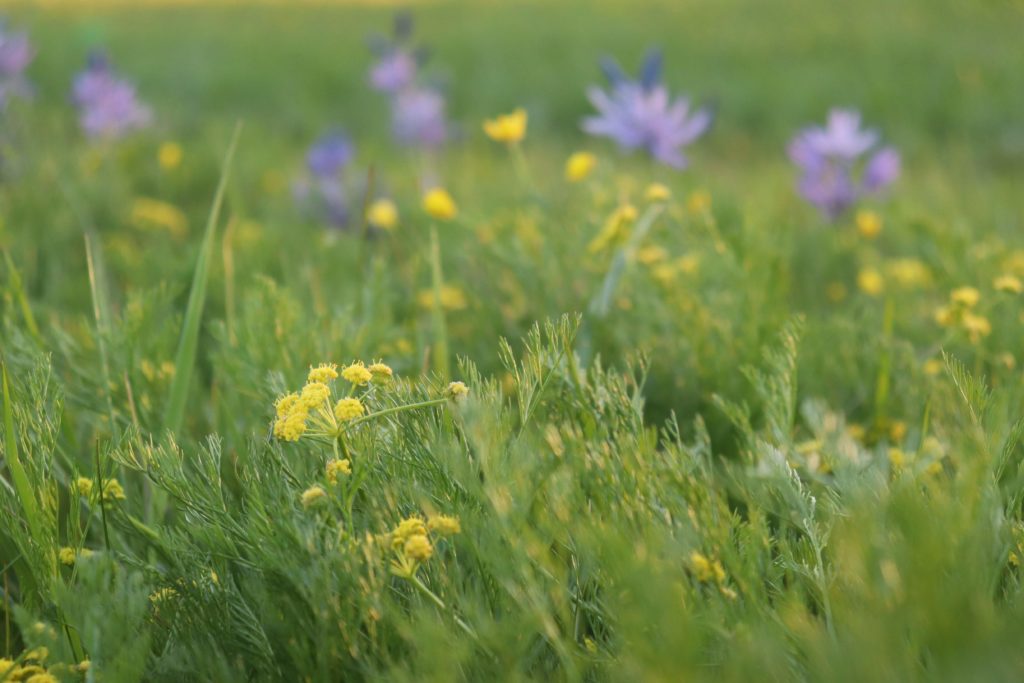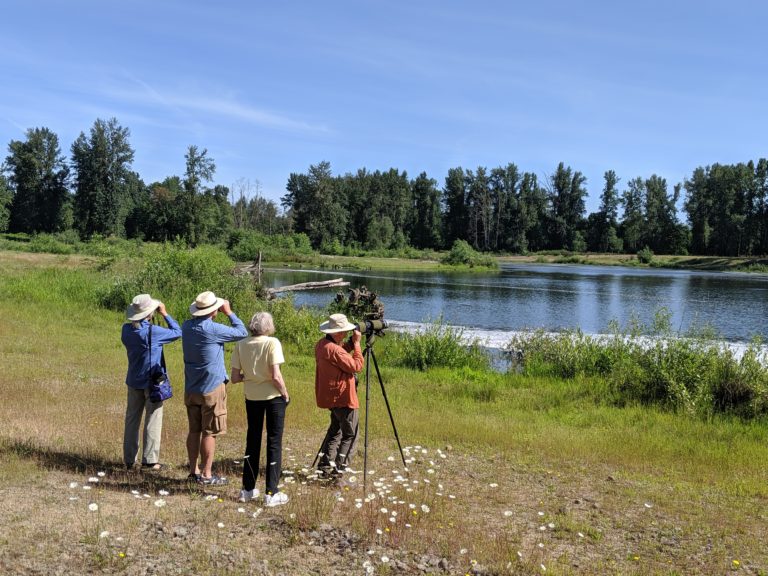About Mckenzie River Trust
Preserving Oregon's Lands and Rivers Since 1989
Our Vision
Clean, free-flowing rivers. Plentiful salmon runs. Vibrant farms and forests that provide livelihoods and habitat. From the Cascade Mountains to the Pacific Ocean, we envision a future in which conservation lands are at the core of community efforts to sustain clean water, abundant fish and wildlife, and diverse natural resource economies in western Oregon.

Our Mission
McKenzie River Trust helps people protect and care for the lands and rivers they cherish in western Oregon.
Our Work
- Protecting special lands. The McKenzie River Trust acquires property interests in land with clear public benefits to ensure that those values will be available to people for many generations.
- Restoring natural systems. The Trust works to enhance and reestablish the native vegetation, water cycles and other functional ecosystem elements appropriate to the places we protect.
- Connecting people to places they care about. The Trust provides site tours, education events, demonstration and research sites, and information about the projects it manages to encourage public support for conservation efforts throughout the region.
The McKenzie River Trust is a nonprofit land trust formed in 1989 to protect critical habitat and scenic lands in the McKenzie basin. Since 2000, our service area has included the watersheds of the Long Tom, Upper Willamette, Coast and Middle Forks of the Willamette, Umpqua, Siuslaw, and coastal streams and lakes from Reedsport to Yachats. In 2021, we expanded our coastal service area to stretch from Reedsport north to Lincoln City, and opened our first field office in Newport.
Throughout our history, the McKenzie River Trust has worked with landowners and diverse partnerships to protect, forever, more than 7,000 acres of special lands in western Oregon.
The McKenzie River Trust acquires land through donation, purchase and conservation easements to provide the greatest assurance that sensitive lands are protected in perpetuity.
The Trust currently protect dozens of conservation projects in Oregon. These lands are protected and managed by the Trust for clean water, fish and wildlife habitat, and productive natural landscapes. The Trust also holds conservation easements on privately owned property. Conservation easements are tailored to each landowner’s needs, rewarding stewardship of natural resources with both protection and financial incentives.
Our Strategic Plan
Our five year strategic plan identifies our priorities and goals through 2024. We invite anyone interested in working with us or supporting our work to read our plan and contact our staff with any questions.

Our Commitment to Diversity, Equity, Inclusion, & Justice
For over 30 years, the McKenzie River Trust has been a trusted partner in land conservation throughout the McKenzie basin and western Oregon. We have pursued our mission of “helping people protect and care for the lands and rivers they cherish” by focusing on habitat diversity and health, river dynamism, and wild landscapes. But we need to more explicitly acknowledge that people and communities have been and continue to be part of these ecosystems. The “helping people” part of our mission compels us to ensure that we are a welcoming organization that fosters a sense of belonging and that our work benefits and engages all people, not just some. Prioritizing diversity, equity, inclusion, and justice (DEIJ) means we must explicitly center the voices, needs, and concerns of the people most harmed by inequities and injustices.
We understand that the conservation movement we are a part of, and the broader system of private land ownership, has committed disproportionate harm to black, Indigenous, and other people of color. This compels us to reflect on how our work has perpetuated injustices, the inequitable distribution of benefits (e.g., access to natural spaces, clean water, clean air), and barriers to owning, accessing, and managing land. Reflecting on this history allows us to more holistically address social issues connected to environmental issues rather than seeing them as separate. All environmental issues have an impact on community health and well-being. That impact is more keenly felt by communities most affected by climate change, land disenfranchisement, and environmental degradation, including Indigenous communities, communities of color, rural communities, working-class communities, and unhoused peoples in western Oregon. We believe these same communities should be engaged and included as thought partners and leaders when crafting conservation solutions and approaches to caring for land and water.
Prioritizing DEIJ in our work supports the work of McKenzie River Trust in maintaining the landscape scale vision required to address climate change and community needs as we work to maintain the ecological integrity of western Oregon’s landscapes. Prioritizing DEIJ also ensures the resiliency and relevancy of our organization by nurturing an environment in which all staff, Board, volunteers, and members thrive and feel a sense of belonging and engagement with our critical mission. Organizational change takes time, proper consideration, and discussion, and we bring forth this commitment statement, having worked internally over many years to evolve to this point.
What is our role?
We are one small land trust in western Oregon within a larger land trust sector within the broader conservation movement. We recognize our power and the need for us to collaborate with others across and beyond the land trust and conservation sectors in working to dismantle inequities and injustices.
- As a land trust organization with resources (land, wealth, connections, power) and community trust, we are uniquely positioned to protect, restore, and manage land in our region in ways that ensure that people’s connection with the land is not limited by persistent and systemic disparities in power and privilege. We can also leverage our niche technical expertise around buying, owning, and stewarding land.
- As a community-based organization, we can focus not only on the landowner but also on community needs more broadly. Our tools can support communities that have been excluded or systemically harmed by land-based policies and practices rooted in settler colonialism and white supremacy culture that have created the foundation of inequity that we inherit as an organization today.
- As a member of a broader land trust movement, we have the responsibility to better understand and reckon with the historical legacy and ongoing structural inequities of land use and land ownership systems in our state and nation, including legacies of oppression, broken treaties, racially restrictive covenants, and redlining in our region.
- As an active participant in this sector, we can influence and work alongside fellow land trusts, watershed councils, and other partners to create a more just region with thriving lands and communities.
What are our commitments?
To better embed DEIJ values in our organization, we make the following commitments, which are supported by a detailed, measurable plan of action and accountability.
- DEIJ in our Programs: McKenzie River Trust commits to integrating DEIJ perspectives into our programmatic work
- Learning & Sharing that Learning: McKenzie River Trust commits to continuing our learning about the intersecting histories of racial injustice and land conservation. We will incorporate new understanding and continue to promote learning opportunities within our spheres of influence.
- Equitable Partnerships: McKenzie River Trust commits to building relationships and engaging in equitable partnership within and outside the conservation sector.
- Representation & Culture: McKenzie River Trust commits to building a more diverse conservation movement, reflective of the communities we serve.
- Indigenous Sovereignty: McKenzie River Trust commits to building and promoting reciprocal relationships with indigenous communities to advance opportunities for land access and tenure.



